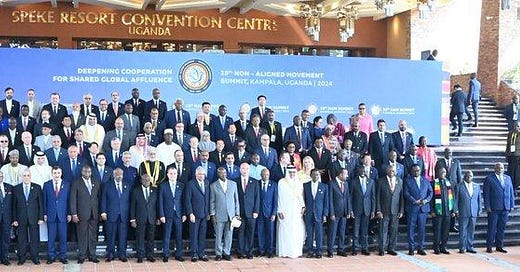The Nineteenth Summit of the Non-Aligned Movement (NAM) was held in Kampala, Uganda on January 19-20, 2024; with the slogan “Deepening cooperation for shared global affluence.” NAM has 120 member states; eighteen countries and ten organizations participated in the Summit as observers. The 120 member states together comprise 58.35% of the world's population.

The Non-Aligned Movement is rooted in the Bandung Conference of April 18-24, 1955, which was held in Bandung, Indonesia, and attended by delegations of twenty-nine governments from Asia and Africa. The conference was convened to discuss the challenges of economic development confronting newly independent nations in the context of the ongoing process of decolonization and the Cold War East-West ideological confrontation.
The Non-Aligned Movement was formally established as an organization of governments duri…


